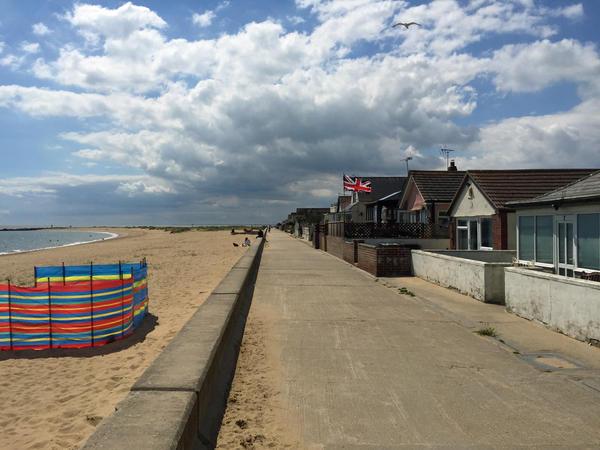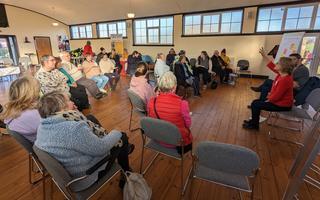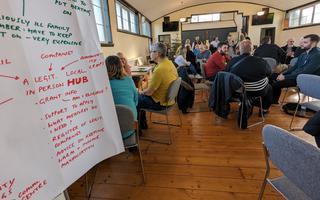Jaywick’s stories of change: improving energy and health futures
This experiment gathered the stories of change of the local residents and businesses of the British coastal town of Jaywick, which is currently suffering from high levels of deprivation and energy challenges relating to poor housing stock. It also gathered local and regional policymakers’ visions for the energy future of the area and bring all these different groups into a dialogue about their respective visions. Ultimately, Essex County Council's aim was to drive community improvement and improve social equality and health outcomes through grassroots, community-led local energy planning in Jaywick.
Local context
Jaywick is a small coastal town in Tendring, Essex. It was originally used as a low-cost holiday site, and the majority of the housing stock in Jaywick is cheaply built accommodation not intended for permanent habitation. However, during the British housing shortage in the aftermath of World War II, the houses began to be used as permanent residence, contrary to their purpose. Additionally, residents of Jaywick have strongly opposed demolition of these houses, which are now largely in significant disrepair. Further, Jaywick is a town of extremely significant deprivation: in The English Indices of Deprivation reports, it has been ranked the most deprived neighborhood in all of England in the previous three reports (2010, 2015 & 2019). 40% of residents are unable to work, and 60% of pupils in the local school receive free meals owing to poverty. Jaywick is also at very high risk of flooding owing to its coastal location.
Specific needs and challenges
The first challenge in Jaywick is that the housing stock is unsuitable for retrofit or renovation, but the community still wants to live in such housing stock and takes much pride in it. The second challenge is the high levels of deprivation and unemployment in the town, which have been portrayed on British TV documentaries, highlighting narratives of precarity, exclusion, and dependence on state benefits. This means that taking people’s experiences and stories seriously will be of paramount importance, as well as being clear about the intended outcomes and avenues for using the community visions that will be produced. In addition, engaging local and regional policymakers in dialogue with local residents could present challenges due to lack of trust in the council, and it is something they will need to pay attention to. —> In addition, engaging local and regional policymakers in dialogue with local residents could present challenges due to lack of trust in the council, and it is something the experiment will need to pay attention to.
Detailed description of the experiment
In terms of the energy transition, Jaywick has a large number of chalet-style housing that is being used for permanent habitation despite being designed as short-lived holiday accommodation many years ago. Residents feel attached to their housing and have been opposing their demolition and redevelopment. Thus, a challenge arises: how can Jaywick work towards the necessary green energy transition when retrofit and redevelopment measures seem incompatible with the local context? This challenge, however, is part of a wider, nationally-relevant question: how can the green energy transition work towards not only better carbon outcomes but better health, social, and economic outcomes for the most deprived neighborhoods in England? In bringing together residents, community and voluntary groups, businesses, and local government staff for visioning workshops, Essex County Council proposes to provide the first steps in a collective transformation of Jaywick powered by the very people within it.
The outputs of the visioning process
The outputs of the visioning process provided the critical initial input into delivering a community-driven local area energy plan. This plan can be used to steer the energy transition within Jaywick in such a way as to ensure its most equitable implementation and can also be formally ratified to provide an official vision of Jaywick's future with respect to energy, guiding its development. This would provide an opportunity to work on eliminating deprivation within Jaywick and nurturing better economic, health, and social outcomes: for example, using the plan and community energy group to identify the best retrofit options for Jaywick's housing situation would lead to better health outcomes for vulnerable residents, present an opportunity to develop local retrofit business leading to employment opportunities, which leads to reduced dependency on financial assistance and so on.
Local engagement
Jaywick has a large population of retired persons, and its young population is at very significant risk of deprivation, which is a result of generational poverty. Additionally, it has a very high number of deprived individuals and households across all age ranges. Essex County Council, as a regional authority, is already engaged with a large number of internal and external stakeholders that ensure access to the spectrum of Jaywick's population. Through those networks, they will be able to involve both the young and older generation in Jaywick to ensure their unique perspectives on Jaywick and its future in the energy transition are captured. This will enable them to work towards ensuring a just, equitable energy transition, with a plan tailored by those who stand to benefit the most from integrated outcomes (energy-health-economy).
Partners
Essex County Council lead this social experiment and plans on working closely and developing existing relationships with local citizen advice and charity services organizations, as well as business enterprise partnerships and the district council. Each organization offers vital resources towards the goal of driving community improvement. Local citizen advice and charity organizations provide a comprehensive network of knowledge on vulnerable and community groups and how to drive the local renewable energy planning. Meanwhile, business enterprise partnerships and the district council provide vital insight on how to leverage this planning into the economic and business development sphere for much greater economic and employment opportunity in Jaywick.
Local partner
Essex County Council
Country
United Kingdom
Number of inhabitants
1,500,000 for Essex; 5,000 for Jaywick
City
Jaywick
Website/social media
Welcome to Essex County Council
Contact person
Louise Tennekoon
Climate Action Engagement Manager
Louise [dot] Tennekoon [at] essex [dot] gov [dot] uktarget="_blank"
Related Green Deal Priorities
TIMELINE
Case Study Guides
|
Find out more


CONTACT
For further details please contact co-leads Professor Chris Foulds (chris.foulds@aru.ac.uk) and Professor Rosie Robison (rosie.robison@aru.ac.uk).

This project has received funding from the European Union’s Horizon 2020 research and innovation program under grant agreement No 101036640. The sole responsibility for the content of this website lies with the SHARED GREEN DEAL HAS project and does not necessarily reflect the opinion of the European Union.










